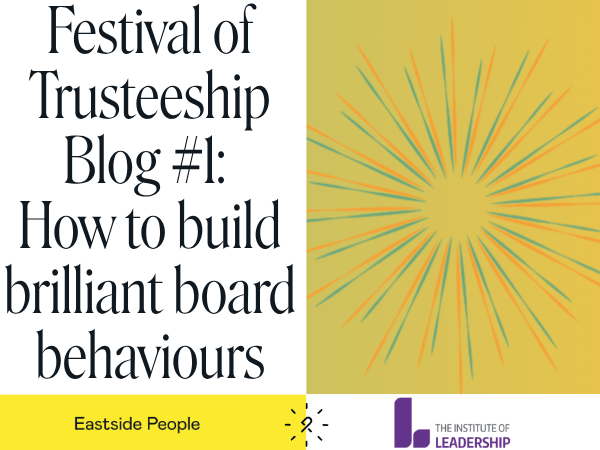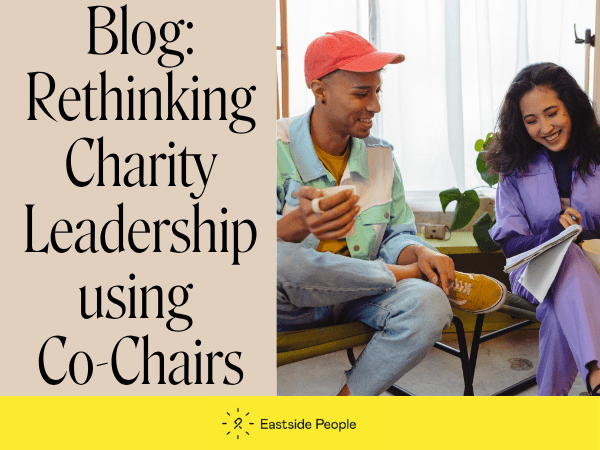Blog by Suneet Sharma and John Sanger
In this blog about one of the top challenges for charity boards, how to fill trustee vacancies, we unpick the reasons for the difficulties in filling these gaps on charity boards. In many cases this could be considered down to either the nature of the trustee role or methods of recruitment, where boards have a space which actually needs filling:
The Charity Commission estimates that almost half of charities have at least one board-level vacancy and whilst it is acknowledged that a vacancy does not necessarily mean a seat urgently needing to be filled (thank you to Festival of Trusteeship Director and Charity Consultant Penny Wilson and Chair of the Association of Chairs Joe Saxton for pointing this out!), this presents an opportunity to interrogate the reasons behind having such a gaps on charity boards.
- A lack of awareness and understanding of the role of trustees – how do you spread the word about the benefits?:
Senior charity leaders and governance professionals who we have supported with recruitment and governance services have a strong view (based on experience), that the role of a trustee is poorly understood by the general public.
In fact, the Charity Commission’s view is that less than 5% of people are aware that trusteeship is a way to support a charity
To encourage more people, and more diverse people, to join boards, we all need to make the role of the trustee and what it entails more visible and accessible to a wider range of people.
“I think we need to start encouraging and socialising trustee roles from a much younger age”. Lara Sonola Octavia Housing Association Non-Executive Director, trustee at Helpforce, a national charity that mobilises volunteers to improve health and care outcomes and Joint Chair at Age UK Wandsworth.
- Trustee commitments can be substantive and at difficult times – can you make them easier?:
Many Board meetings are held in the evenings and even with prior planning the most accessible format we have seen is early lunch with meetings planned well in yearly cycles. In any event, meetings usually exceed an hour with trustees required to attend in-person. This can be extremely difficult for those with children and/or caring responsibilities. Tools such as Microsoft Teams or Zoom can improve flexibility (but and while we believe that many charities could make better use of virtual meetings, they are of course not suitable for every board for various reasons.
“Some people with the necessary skills, backgrounds or lived experiences do not apply because they do not believe that they can fulfil the role or even worse, that they are worthy of it. This is so not true, we need to change perceptions so that they feel welcomed.” Felicity Clark, Chair of Trustees, Caring in Bristol.
- Trustee recruitment methods are too narrow:
The majority of trustees are informally recruited through networks rather than a wide search. Research by CASS Business School in 2017 found that a staggering 71% (2,485) of 3,500 trustees surveyed were recruited informally.
More recent data in a joint report by the Charity Commission and Pro Bono Economics covering the entire scope of the trusteeship within the sector, found that the majority of charities rely on their existing networks to find and recruit trustees.
Their survey of 2,194 trustees found that only one in seventeen people (6%) were hired after responding to an advert, that is just 132 people. Further, one in three (29%) were asked to join the board by the Chair, with almost a quarter (24%) recruited by another board member and another (29%) nominated or elected by people within the charity.. This approach clearly closes off accessible avenues to trusteeship, stifling diversity of background and thought whilst exacerbating difficulties with succession planning.
“I do not know how you can get a diverse board, with a range of skills, if you rely on informal recruitment.” Ken Batty NED The Tavistock and Portman NHS Trust and Chair at Mosaic LGBT+ Young Persons’ trust.
- Legal responsibility with little perceived upside or reward to trusteeship:
We need to challenge and reframe the value proposition of being a trustee. The most common reasons provided from recent Charity Commission data for becoming a trustee were:
-
- Using existing skills in a new context
- Being more connected to the community
- And/or feeling positive impact.
We need to shout about this and appeal to these altruistic values in our approach to trusteeship and recruitment. In short, very few charities really ‘sell’ what they are offering effectively. Many adverts simply describe the role without telling the reader why this might excite them – “like trying to sell Coca-Cola by listing the ingredients”, in the words of recruitment marketing expert Mitch Sullivan.
“I think part of the challenge is that trusteeship is predominantly unpaid. But unlike a lot of voluntary commitments, it also involves statutory responsibilities and sometimes involves making very difficult decisions which no one wants to volunteer to undertake”- Jack Liepa Chair of the Board of Trustees at Sexpression:UK, Trustee The Prod Trust and NED The FGM Education Project.
Suneet originally asked people for their views on the trustee recruitment challenge in a LinkedIn post. Read the LinkedIn thread for the fuller discussion on the topic.
Can we help?
Our charity recruitment consultants provide specialist recruitment, executive search & interim management services to charities & social enterprises. Our in-depth sector expertise & open, values-based approach ensures a positive experience for everyone. We are committed to equality & diversity. We help our clients to use inclusive recruitment to address the underrepresentation of some groups of people in leadership teams.
If you’d like to discuss how to find the right people for you charity or not-for-profit’s board, you can book a free 30-minute consultation with one of our charity recruitment specialists to explore how we can help you secure the ideal mix of board members.









